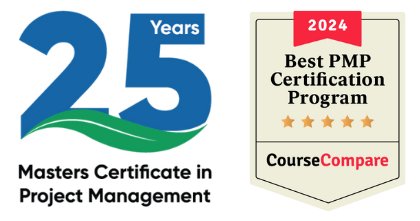Masters Certificate in Project Management
Break into the Project Management Industry.
In today’s fast-paced industries, project managers are in high demand, but how do you veer into Project Management? Schulich ExecEd’s Masters Certificate in Project Management can break you into this industry, giving you the ins and outs of leading a project from ideation to in-market success. You’ll gain the experts tools, strategies and hands-on practice to kickstart your project management career.
THREE convenient pathways for completing the program:
– Spring session: part-time evening modules delivered fully online
– Fall session: Friday and Saturday classes delivered in a hybrid format with blended in-person and online sessions
– Winter session: Friday and Saturday classes delivered fully online

Masters Certificate in Project Management
December 13, 2024
- Location:
- Online Miles S. Nadal Management Centre (Hybrid)
Masters Certificate in Project Management
- Programs
-
- Masters Certificate in Project Management
Master Project Management
From
Start To Finish
Today, virtually everything qualifies as a project: new business systems, IT enhancements, engineering projects, product development, event coordination–the list is endless. Accordingly, project management is a booming industry, projected by the Project Management Institute (PMI) to create 2.3 million jobs every year, with everyone from executive assistants to vice presidents a potential project manager. But how do you stand out from other professionals and thrive in this growing industry?
In this Masters Certificate program, you’ll learn from experts in project management (PM) and distinguish yourself with competitive training, preparing you for a project manager role. Build a PM toolbox with detailed lessons on ‘Principles of Behaviour’ and ‘Performance Domains’ from the Project Management Body of Knowledge (PMBoK®). Learn the latest vocabulary and join industry conversations with up-to-date content on Agile and Scrum.
Participants preparing for the PMP® (Project Management Professionals) designation exam will gain mastery of related topics and fulfill their required contact hours (please refer to the Project Management Institute (PMI) for application requirements). At the end of the program, you can also choose to participate in 25 hours of PMP Exam Prep modules with a deep deep-dive review of exam materials.
The MCPM is the longest-running and most successful project management training program in Canada, ranked by CourseCompare as a top PMP Certification program. With just 12 days of study over 6 months, aspiring leaders and managers in industries such as project management, analysis, operations and consulting will develop sought-after expertise taken from a curriculum developed by the Project Management Institute (PMI®).
Schulich ExecEd has been reviewed and approved by the PMI® Authorized Training Partner Program. Earners of the Authorized Training Partner Program badge are authorized by PMI to support the professional development needs of future or current PMI practitioners and stakeholders in their pursuit of PMI Credentials.
This program is ideal for aspiring project management professionals looking to break into the industry, particularly participants in entry-level roles like associate, coordinator, and assistant, across industries such as Healthcare, IT, Construction, and Energy.
THREE convenient pathways for completing the program:
– Spring session: part-time evening modules delivered fully online
– Fall session: Friday and Saturday classes delivered in a hybrid format with blended in-person and online sessions
– Winter session: Friday and Saturday classes delivered fully online
Supplement In-Class Instruction
To supplement in-class instruction, participants will apply program learnings and insights to coursework and readings outside the classroom.
DISCLAIMER: Schulich ExecEd requires a non-refundable deposit from all students as part of the enrolment process. Domestic students are required to submit a $1,000 deposit, while international students are required to submit a 50% deposit. If you have any questions or concerns, please contact our advisors for assistance.
Get Training in Marketable Skills
 Budget Management
Budget Management
 Leadership Skills
Leadership Skills
 Negotiation Skills
Negotiation Skills
 Risk Assessment
Risk Assessment
 Time Management
Time Management
 Critical Thinking
Critical Thinking
 Communication Skills
Communication Skills
 Organization Skills
Organization Skills
6 Reasons to Enrol
Amazing Education for Busy Professionals
This program spreads 12 days of study over 6 months, giving busy professionals time to master project management without a massive time commitment.
Stand Out from the Crowd
Gain proven tools and professional templates to establish your expertise in project management.
Learn from the Pros
Train with top-rated Schulich ExecEd instructors that are consistently ranked among the world’s best.
Tackle Exciting Challenges
Participants preparing for the PMP® designation exam through PMI can choose to join 2-hour optional modules and receive an extensive review of exam requirements.
Build A Meaningful Network
Connect with and learn from peers, fellow project managers and leaders across a wide range of sectors, industries and professions.
Earn Higher Pay
Schulich ExecEd students gain the confidence, skills and perspective to attain better roles, launch new ventures, and lead their teams to new heights.
Who Will Benefit
Program Overview
-
This module offers a comprehensive review of program deliverables. Receive an introduction to the program’s objectives, an overview of project management knowledge areas according to standards set by the Project Management Institute (PMI), and an initiation into the project simulation/case study central to the program.
Cover key areas such as the deployment of tools and technology and team leadership.
-
Establish a solid foundation for successful planning and implementation, covering key aspects such as forming project teams, scoping projects, and managing within a Matrix Environment. Gain insights into developing detailed and high-level project management plans, creating activity-based network diagrams, and effectively working with the critical path. The module also includes the delivery and utilization of essential tools and technology throughout the program.
-
Delve into effective approaches for evaluating project uncertainties and risks, encompassing a project risk management framework, risk considerations in both planning and execution and quantitative techniques for identifying and responding to risks through team facilitation.
Explore the application of decision trees and expected monetary value, along with advanced techniques like the Delphi method and Monte Carlo simulation in risk management.
-
Enhance project effectiveness in HR, communications, and stakeholder management. Learn to communicate meaningfully and effectively with project stakeholders, and support project success through team selection, development, and management.
Then, dive into strategies for navigating challenging communication environments, including organizational change, diversity, and virtual teams.
-
Get a guide on managing projects with a focus on cost minimization. Topics include cost estimating at micro and macro levels, resource planning, budgeting, and effective cost control. Explore earned value concepts and gain insights into managing fixed, variable, and unit costs, culminating in comprehensive status reporting for project oversight.
-
Apply your program learnings to propose, plan, execute and deliver a full-scale, realistic project from start to finish. Review all topics and understand how the moving parts are integrated.
-
This program offers specially designed 2-hour optional modules to guide PMP Exam candidates through a comprehensive review of exam requirements. Get exclusive access to online videos, interviews, and articles covering the future of Project Management.
-
Introduction to Agile and Scrum (2 hours)
Dive into Agile and Scrum methodologies and their practical application to any project. Covering essential topics such as sprint preparation, execution, and closure, you’ll gain valuable insights into implementing these frameworks effectively in project management.
Project Quality Management (2 hours)
Focus on integrating quality measures into every project, covering key areas such as developing detailed and high-level project management plans and an introduction to Earned Value Management. The module also addresses meeting stakeholder requirements through the implementation of various control strategies.
Contracting, Procurement and Negotiation Skills (2 hours)
Get equipped with the skills to successfully manage key vendors and partners. Topics include procurement and solicitation planning, principles of solicitation and negotiation, source selection strategies, and insights into contract close-out and contract law for effective vendor and partner management.
-
Fall 2024 Dates Time Program Introduction 10/4/2024 - 10/5/2024 8:30 am - 5:00 pm Project Planning & Control 10/17/2024 - 10/19/2024 8:30 am - 5:00 pm Assessing and Managing Project Risk 11/1/2024 - 11/2/2024 8:30 am - 5:00 pm Leadership, Communication and Stakeholder Management 11/15/2024 - 11/16/2024 8:30 am - 5:00 pm Effective Project Cost Management 11/29/2024 - 11/30/2024 8:30 am - 5:00 pm Project Integration & Simulation 12/13/2024 - 12/13/2024 8:30 am - 5:00 pm
Faculty
What You Get
After completing the Masters Certificate in Project Management, you'll receive an authentic digital badge from the #1 business school in Canada that employers will recognize.
As more and more companies look for candidates with specific skills, this badge on your CV will be a credible assurance of your achievements and expertise, allowing the right roles to find you faster.
Masters Certificate
Awarded when a series of more extensive programs are completed and a greater skill set achieved.
Suggested Programs Based on
Your Interest in Masters Certificate in Project Management
We handpicked the following programs based on
time, cost and relevant skills.

Custom Programs for Organizations
Use this program as we designed it, or alter it to fit your company’s needs. Either way, we can help you improve your organization's talent pipeline. Get in touch with our custom programs team today.
Start HereMake the Right Choice. Try Our Advisory Services.
The next step of your career matters. A Schulich ExecEd program advisor can help you choose a course that fits your budget and schedule. Get in touch with us today.
Talk to an Advisor































